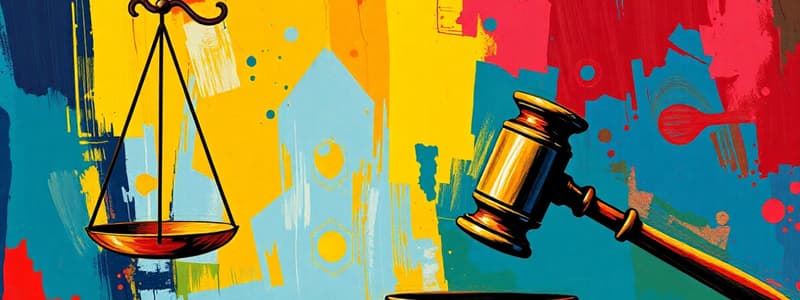Podcast
Questions and Answers
Quel est le principe fondamental qui régit l'application de la loi pénale dans le temps ?
Quel est le principe fondamental qui régit l'application de la loi pénale dans le temps ?
- Le principe de légalité (correct)
- L'absence de dispositions transitoires
- L'effet rétroactif des lois
- La prévisibilité des peines
Quand une loi entre-t-elle généralement en vigueur si aucune disposition transitoire n'est spécifiée ?
Quand une loi entre-t-elle généralement en vigueur si aucune disposition transitoire n'est spécifiée ?
- Immédiatement après son approbation
- À la date d'entrée en vigueur fixée par le gouvernement
- Une semaine après sa promulgation
- Le lendemain de sa publication au Journal officiel (correct)
Quelle est la caractéristique de l'application rétroactive d'une loi nouvelle ?
Quelle est la caractéristique de l'application rétroactive d'une loi nouvelle ?
- Elle n'est jamais autorisée par le Code civil
- Elle s'applique uniquement aux situations en cours
- Elle est valable uniquement pour les infractions graves
- Elle concerne les situations antérieures non jugées (correct)
Quelles conditions peuvent retarder l'application d'une loi nouvelle ?
Quelles conditions peuvent retarder l'application d'une loi nouvelle ?
Quelle est la différence entre l'application immédiate et l'application post-active d'une loi nouvelle ?
Quelle est la différence entre l'application immédiate et l'application post-active d'une loi nouvelle ?
Quelle hypothèse permet l'effet immédiat de la loi nouvelle sur les situations en cours de constitution ?
Quelle hypothèse permet l'effet immédiat de la loi nouvelle sur les situations en cours de constitution ?
Quel principe interdit la rétroactivité d'une loi nouvelle plus sévère ?
Quel principe interdit la rétroactivité d'une loi nouvelle plus sévère ?
Quelle valeur est associée à l'article 112-1 concernant les infractions ?
Quelle valeur est associée à l'article 112-1 concernant les infractions ?
Quel article garantit que nul ne peut être puni qu'en vertu d'une loi antérieure au délit ?
Quel article garantit que nul ne peut être puni qu'en vertu d'une loi antérieure au délit ?
Quelle est la conséquence de la non-rétroactivité des lois plus sévères ?
Quelle est la conséquence de la non-rétroactivité des lois plus sévères ?
L'hypothèse de la rétroactivité in mitius s'applique dans quel cas ?
L'hypothèse de la rétroactivité in mitius s'applique dans quel cas ?
Quel principe est directement lié à l'expression 'Moneat lex priusquam feriat' ?
Quel principe est directement lié à l'expression 'Moneat lex priusquam feriat' ?
Quel est le principe de rétroactivité des lois interprétatives ?
Quel est le principe de rétroactivité des lois interprétatives ?
Quelle condition doit être remplie pour qu'un revirement de jurisprudence ait une rétroactivité in pejus ?
Quelle condition doit être remplie pour qu'un revirement de jurisprudence ait une rétroactivité in pejus ?
Qu'indique l'article 112-2 sur les lois pénales nouvelles ?
Qu'indique l'article 112-2 sur les lois pénales nouvelles ?
Quelle est la durée de prescription pour un délit selon le contenu fourni ?
Quelle est la durée de prescription pour un délit selon le contenu fourni ?
Quel est le délai butoir pour les infractions occultes selon le contenu ?
Quel est le délai butoir pour les infractions occultes selon le contenu ?
Quel est le principe entourant l'application rétroactive des lois nouvelles plus douces ?
Quel est le principe entourant l'application rétroactive des lois nouvelles plus douces ?
Quelle valeur ne peut pas être attribuée aux lois nouvelles plus douces selon les principes mentionnés ?
Quelle valeur ne peut pas être attribuée aux lois nouvelles plus douces selon les principes mentionnés ?
Quel article affirme que les peines cessent de recevoir exécution lorsqu'elles deviennent non pénales par une loi postérieure ?
Quel article affirme que les peines cessent de recevoir exécution lorsqu'elles deviennent non pénales par une loi postérieure ?
Quelle hypothèse exige une appréciation globale lorsque la loi est indivisible ?
Quelle hypothèse exige une appréciation globale lorsque la loi est indivisible ?
Quelle est la conséquence d'une loi douce en cas d'infraction déjà prononcée ?
Quelle est la conséquence d'une loi douce en cas d'infraction déjà prononcée ?
En cas de décret créant de nouvelles obligations, quelle règle s'applique concernant la rétroactivité ?
En cas de décret créant de nouvelles obligations, quelle règle s'applique concernant la rétroactivité ?
Quelle proposition est incorrecte concernant l'application de lois mixtes ou complexes ?
Quelle proposition est incorrecte concernant l'application de lois mixtes ou complexes ?
Qui confirme l'application des lois nouvelles selon le Conseil constitutionnel ?
Qui confirme l'application des lois nouvelles selon le Conseil constitutionnel ?
Pourquoi des dispositions non rétroactives peuvent-elles être justifiées en matière de nouvelle loi ?
Pourquoi des dispositions non rétroactives peuvent-elles être justifiées en matière de nouvelle loi ?
Flashcards
Principe de légalité
Principe de légalité
L'infraction et sa peine doivent être définies avant le comportement pour garantir la prévisibilité.
Entrée en vigueur d'une loi
Entrée en vigueur d'une loi
Date à laquelle une loi devient applicable, fixée par la loi ou, à défaut, le lendemain de la publication au Journal Officiel.
Application immédiate d'une loi nouvelle
Application immédiate d'une loi nouvelle
La loi nouvelle régit les situations en cours mais pas les situations déjà achevées.
Application post-active d'une loi nouvelle
Application post-active d'une loi nouvelle
Signup and view all the flashcards
Application rétroactive d'une loi nouvelle
Application rétroactive d'une loi nouvelle
Signup and view all the flashcards
Hypothèses de résolution de conflits de lois dans le temps
Hypothèses de résolution de conflits de lois dans le temps
Signup and view all the flashcards
Non rétroactivité in pejus
Non rétroactivité in pejus
Signup and view all the flashcards
Rétroactivité in mitius
Rétroactivité in mitius
Signup and view all the flashcards
Loi nouvelle plus sévère
Loi nouvelle plus sévère
Signup and view all the flashcards
Loi nouvelle plus douce
Loi nouvelle plus douce
Signup and view all the flashcards
Effets post-actifs
Effets post-actifs
Signup and view all the flashcards
Lois interprétatives
Lois interprétatives
Signup and view all the flashcards
Rétroactivité des lois interprétatives
Rétroactivité des lois interprétatives
Signup and view all the flashcards
Revirement de jurisprudence
Revirement de jurisprudence
Signup and view all the flashcards
Rétroactivité in pejus
Rétroactivité in pejus
Signup and view all the flashcards
Application immédiate des autres types de lois pénales
Application immédiate des autres types de lois pénales
Signup and view all the flashcards
Principe de nécessité
Principe de nécessité
Signup and view all the flashcards
Valeur légale
Valeur légale
Signup and view all the flashcards
Valeur constitutionnelle
Valeur constitutionnelle
Signup and view all the flashcards
Valeur conventionnelle
Valeur conventionnelle
Signup and view all the flashcards
Loi divisible
Loi divisible
Signup and view all the flashcards
Loi indivisible
Loi indivisible
Signup and view all the flashcards
Disposition principale
Disposition principale
Signup and view all the flashcards
Appréciation globale
Appréciation globale
Signup and view all the flashcards
Study Notes
Application de la loi pénale dans le temps
- Principe de légalité: An infractions and its penalties must be defined before the act occurs to ensure predictability.
- Article 112-1: Only acts that are criminal infractions at the time they are committed can be punished. Only penalties applicable at the time of the crime can be imposed.
- Entrée en vigueur des lois: Laws and administrative acts in France enter into force on the date specified, or, if no date is given, the day after publication in the official journal.
- However, if the execution of a law requires the implementation of further measures: the effective enforcement date is delayed until the date that those measures enter into effect. If there are transition provisions, the specified date in the law is used. If not, the entry into effect is set to the day after publication in the official journal.
Types of legal application over time
- Immediate application: A new law applies to ongoing situations, but not to situations already completed.
- Post-active application: A new law only applies to situations occurring after it's official publication.
- Retroactive application: A new law applies to situations that occurred before its publication, but not already judged.
Confict Resolution on laws over time
- Survival of the previous law: The old law (L1) applies to legal situations that existed before the new law (L2) came into effect. The new law (L2) only applies to legal situations arising after its effective date.
- Immediate effect of the new law: The new law (L2) applies to current, ongoing legal situations, as well as situations where the old law (L1) effects haven´t been used yet.
- Retroactive effect of the new law: The new law (L2) applies to situations already in effect according to the old law and its consequences.
Non-retroactivity of penal laws
- Rationale: Avoiding retroactive application of harsher laws, upholding the principle of legality. The expression "moneat lex priusquam feriat" (the law should warn before it strikes) emphasizes this principle, highlighting the right to be informed of the law.
- Consequences: The new law does not apply to past acts judged under the old law.
- Value: Legal, constitutional, and conventional values underline this principle against the retroactivity of harsher punishments. Emphasis on the earlier existing law.
Retroactivity of mitigating laws
- Rationale: While legal principles generally reject retroactivity, this concept allows for the new law to work in the best interests of the judicial subjects.
- Consequences: Application of the new law back to past situations, especially for softer penalties.
- Value: It is linked to legal principles, constitutional guidelines, and conventions of the human rights. Focus on the new law's positive or mitigating effect.
Other types of penal laws
- Laws affecting the prescription of public action: The principles apply irrespective of the circumstances regarding the penalties.
- Laws related to fines imposition: laws apply immediately to crimes committed before their publication date.
Laws regarding penalty execution
- General rule Immediately applicable laws affecting how penalties are imposed.
- Exception: If a new law makes penalties harsher or alters their execution, those aspects will only effect events starting after the law's date of entry.
Laws Instituting Measures of Surveillance
- Nature of measures: Preventative, restrictive measures focusing on the individual's perceived danger, not culpability.
- Application: Immediate application of new laws.
- Legal value and constitutional limitations: The principle of non-retroactivity of harsher measures prevails. Existing laws cannot be used to justify punishment of or measures against individuals for their future conduct.
Studying That Suits You
Use AI to generate personalized quizzes and flashcards to suit your learning preferences.





